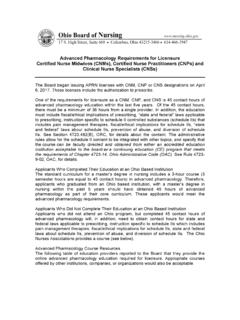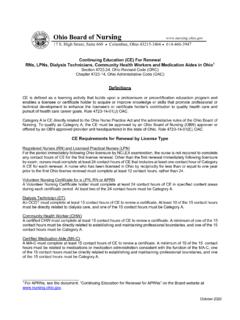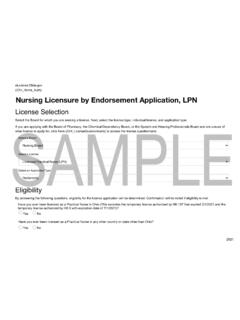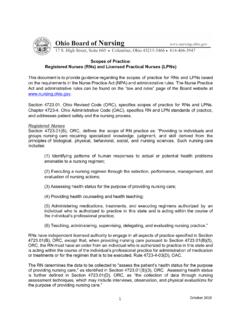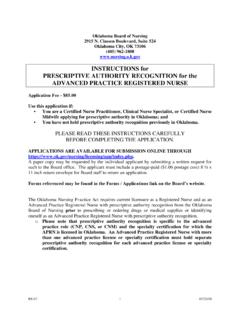Transcription of APRN Licensure and Practice - Ohio Board of Nursing
1 February 2021 1 APRN Licensure and Practice in Ohio The purpose of this document is to provide licensees and the public an overview of license and Practice requirements for APRNs established in the Nurse Practice Act (NPA), Ohio Revised Code Chapter 4723. and the administrative rules adopted by the Ohio Board of Nursing and is not intended to be all-inclusive. APRNs are responsible for knowing and complying with the NPA and rules, and any other applicable state and federal law. The NPA and administrative rules are accessible on the Board website: under the Law and Rules section. This document is comprised of two parts. The first part is a summary of APRN information.
2 The second part is Frequently Asked Questions . Designations of APRNs in Ohio APRNs in Ohio may be designated as a: Certified Registered Nurse Anesthetist (CRNA); Certified Nurse-Midwife (CNM); Clinical Nurse Specialist (CNS); or Certified Nurse Practitioner (CNP). A separate APRN license is required for each designation. A RN may hold one or more APRN license designations. Definitions Nursing specialty is defined by Section (V), ORC, and Rule 4723-8-01(G), OAC, to mean a specialty in Practice as a certified registered nurse anesthetist, clinical nurse specialist, certified nurse-midwife, or certified nurse practitioner. (Emphasis added.) Practice of Nursing as an advanced Practice registered nurse is defined by Section (P), ORC, and Rule 4723-8-01(F) to mean providing to individuals and groups Nursing care that requires knowledge and skill obtained from advanced formal education, training and clinical experience.
3 Such Nursing care includes the care described in Sections , , , and of the Revised Code. APRN Licensure The NPA establishes minimum requirements for APRN initial and continued Licensure . The following summarizes the requirements for initial APRN Licensure : An active Ohio RN license. As of January 1, 2001, an earned masters or doctoral degree with a major in a Nursing specialty ( Nursing specialty equates to the applicable resulting national certification achieved) or in a related field that qualifies the nurse to sit for the certification examination of a national certifying organization approved by the 1 Except that, under (B)(2), ORC, a CRNA, CNM, or CNP applicant who is practicing or has practiced in another jurisdiction is exempt from the educational requirements in (A)(2), ORC, if all of the following are the case.
4 (1) The applicant submits documentation that prior to January 1, 2001, they obtained certification in the applicant's Nursing specialty with a qualified national certifying organization; and, (2) The applicant submits documentation satisfactory to the Board that the applicant has maintained that certification. A similar exemption applies to applicants who were issued a certificate of authority by the Board prior to January 1, 2001 ( (C), ORC). February 2021 2 As of January 1, 2001, a minimum of one current national certification in a Nursing specialty/population focus by a national certifying organization approved by the Board that qualifies the nurse for the APRN designation and For cnms , cnss and cnps , proof of completion of a course that is not less than 45 contact hours in advanced pharmacology with content that meets Section (B), ORC.
5 The course must be completed no longer than five years prior to submitting the application for APRN Licensure . Not all advanced pharmacology courses contain the content required by Section (B), ORC, which may be completed through qualifying continuing education to meet the requirements for Licensure . For cnms , cnss and cnps applicants from another jurisdiction, proof of prescriptive authority in another jurisdiction and completion of a two-hour course in Ohio prescribing law. Submission of a complete APRN license application with accompanying fees. The following summarizes requirements for APRN license renewal: Documentation that qualifying national certification has been maintained, with exception of grandfathered Ohio RN license is active CE requirements have been or will be met by the renewal deadline.
6 A complete APRN renewal application with fee payment has been submitted, which includes, for cnms , cnss , and cnps , the names/business addresses of collaborating physician or podiatrist(s), by the renewal deadline APRN Education Programs are not Regulated by the Board The Board does not regulate Nursing education programs that prepare RNs for APRN Licensure in Ohio, nor does the Board maintain a list of APRN education programs. The APRN program completed must qualify the applicant to sit for the certification examination of a national certifying organization approved by the Board . Questions or concerns regarding an APRN education program should be addressed to the accrediting agency or the Ohio Department of Higher Education.
7 2 Except that, under Section (B)(2), ORC, a CNS applicant who is practicing or has practiced in another jurisdiction is exempt from the examination requirement of (A)(3), if ( the applicant submits documentation that prior to January 1, 2011, the applicant earned either: (a) A master's or doctoral degree with a major in a clinical area of Nursing from a qualified educational institution, or, (b) A master's or doctoral degree in Nursing or a related field and was certified as a CNS by the American Nurses Credentialing Center or another national certifying organization approved at that time by the Board . A similar exemption applies to applicants who were issued a certificate of authority by the Board prior to January 1, 2001 ( (D), ORC 3 Section 4723-8-08(A)(2), OAC provides that, a CNS, originally issued a certificate of authority on or before December 31, 2000 in accordance with division (C) of section (C), ORC, as that division existed prior to March 20, 2013, is not required to provide documentation of having maintained certification in the holder's specialty, but shall submit documentation satisfactory to the Board of completion of continuing education in compliance with paragraph (E) of rule 4723-8-10, OAC.))
8 February 2021 3 Approved National Certifying Organizations Each year in accordance with Section , ORC, and Rule 4723-8-06, OAC, the Board approves National Certifying Organizations. One of the criteria for Board approval is that the organization has testing requirements that measure the theoretical and clinical content of a Nursing specialty that are developed in accordance with accepted standards of validity and reliability, and that the testing is open to RNs who have successfully completed the APRN program required by the specific national certifying organization. The Board s list of approved National Certifying Organizations is published and available on the Board of Nursing website: under the Practice Resources/ Practice APRN section.
9 Certifying Examinations and National Certifications Issued by the Board Approved National Certifying Organization National Certifying Organizations administer and maintain the national certifying examinations required for APRN Licensure and Licensure maintenance. The National Certifying Organization establishes criteria that must be met for an APRN to re-certify and maintain their national certification. APRNs must contact the National Certifying Organization for its initial certification and re-certification requirements. The resulting national certification(s) reflects the APRN s Nursing specialty in Practice as a CRNA, CNS, CNM or CNP. It is the APRN or APRN applicant s responsibility to contact the National Certifying Organization and request their national certification documentation be sent directly to the Board .
10 NPA and Rules Define APRN Scope of Practice : Sections , and , , and , ORC, define the scope of Practice of each APRN designation (CNM, CNS, CNP and CRNA) including Practice limitations and prescriptive authority. Additional sections of the NPA and Administrative Rules (ORC Sections: , ; ; ; ; ; and Chapter 4723-9, OAC) specify requirements and parameters of prescriptive authority, including limitations on issuing prescriptions for schedule II controlled substances, and use of opioids to treat acute and subacute and chronic pain. Rule 4723-8-02, OAC, Standards of Practice , says that an APRN shall provide to patients Nursing care that requires knowledge and skill obtained from advanced formal education, which includes a clinical practicum, and clinical experience as specified in Sections , and , ORC and this chapter.
